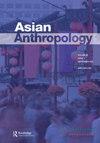Poverty alleviation, community participation, and the issue of scale in ethnic tourism in China
Q2 Social Sciences
引用次数: 4
Abstract
Abstract While tourism development has become an important strategy for poverty alleviation, especially in China’s ethnic minority regions, existing studies observe widespread development problems, including uneven distribution of benefits and the marginalization of local residents. These realities challenge the popular belief in “scaling up” economic growth. Focusing on its gongfen (work-point) system, this article provides an ethnographic account of Upper Langde’s community-based tourism development and its evolution, especially the transition from no outsiders’ involvement to the county-government-directed “second development.” It records stakeholder interactions and narratives in quotidian routines, and reveals the internal village tensions, as well as its conflicts with the county government and the county-government-owned tourism company. Through this case study, I argue that “small” (scaled-down) and “slow” (low or no growth) might be what it takes to strengthen community participation and achieve fair distribution for poverty alleviation.扶贫、社区参与与中国民族旅游的规模问题
摘要尽管旅游业发展已成为扶贫的一项重要战略,特别是在中国少数民族地区,但现有研究发现了普遍存在的发展问题,包括利益分配不均和当地居民边缘化。这些现实挑战了“扩大”经济增长的普遍信念。本文以贡芬(工点)系统为中心,对上朗德社区旅游业的发展及其演变,特别是从没有外来者参与到县政府主导的“二次开发”的转变进行了民族志描述,揭示了乡村内部的紧张关系,以及乡村内部与县政府、县政府所属旅游公司的矛盾。通过这个案例研究,我认为“小”(缩小规模)和“慢”(低增长或无增长)可能是加强社区参与和实现公平分配以减轻贫困所需要的。
本文章由计算机程序翻译,如有差异,请以英文原文为准。
求助全文
约1分钟内获得全文
求助全文
来源期刊

Asian anthropology
Social Sciences-Anthropology
CiteScore
1.60
自引率
0.00%
发文量
25
期刊介绍:
Asian Anthropology seeks to bring interesting and exciting new anthropological research on Asia to a global audience. Until recently, anthropologists writing on a range of Asian topics in English but seeking a global audience have had to depend largely on Western-based journals to publish their works. Given the increasing number of indigenous anthropologists and anthropologists based in Asia, as well as the increasing interest in Asia among anthropologists everywhere, it is important to have an anthropology journal that is refereed on a global basis but that is editorially Asian-based. Asian Anthropology is editorially based in Hong Kong, Taiwan, and Japan, but welcomes contributions from anthropologists and anthropology-related scholars throughout the world with an interest in Asia, especially East Asia as well as Southeast and South Asia. While the language of the journal is English, we also seek original works translated into English, which will facilitate greater participation and scholarly exchange. The journal will provide a forum for anthropologists working on Asia, in the broadest sense of the term "Asia". We seek your general support through submissions, subscriptions, and comments.
 求助内容:
求助内容: 应助结果提醒方式:
应助结果提醒方式:


